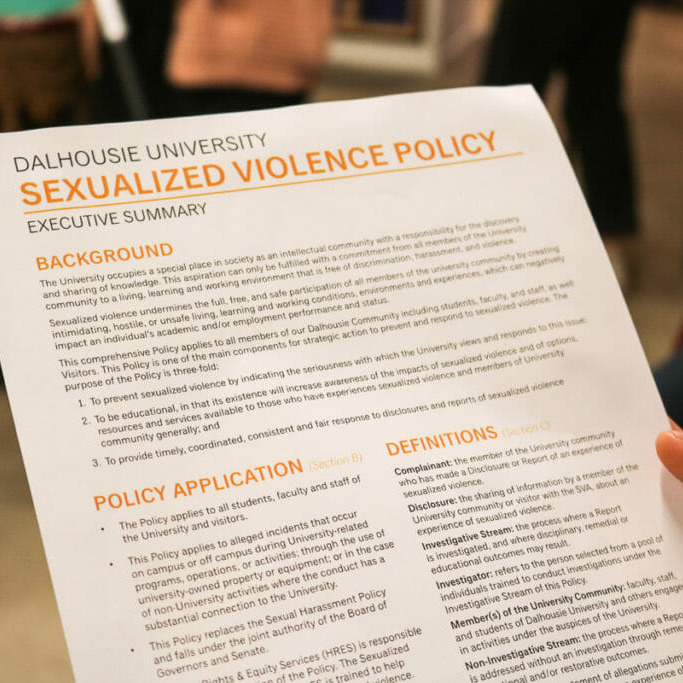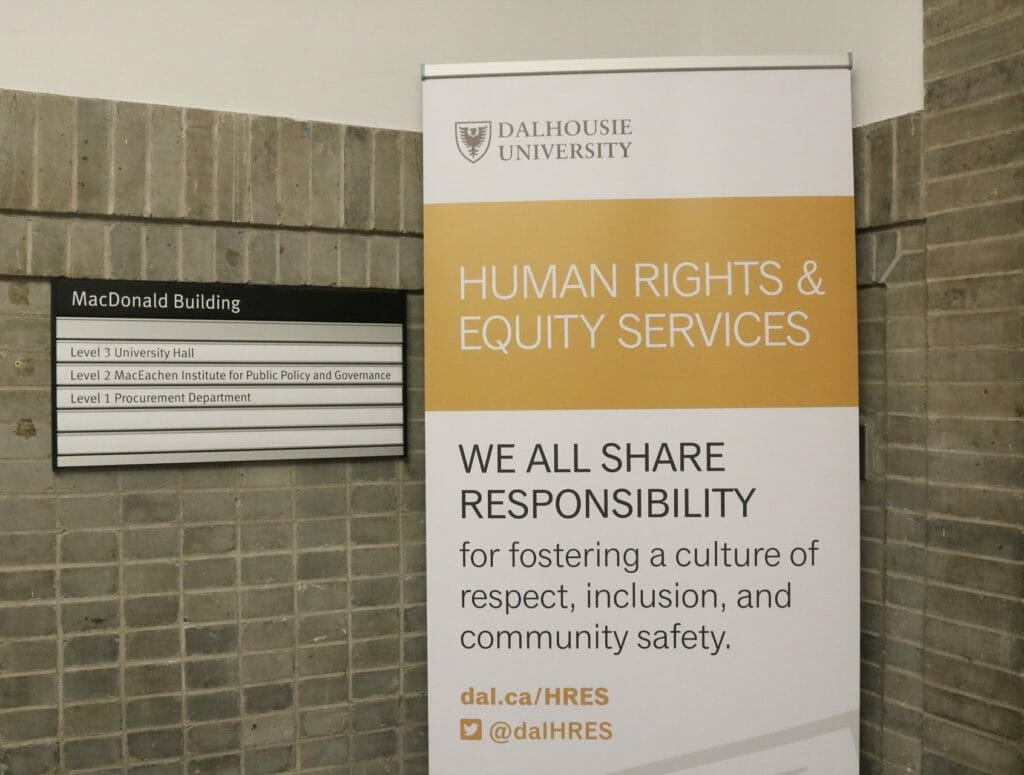
Sharing a classroom with your harrasser
A Dal student navigates the university’s Human Rights and Equity Services
Editor’s note: The Dalhousie Gazette has withheld the real names of both the victim and the alleged harasser in this story in order to protect the victim.
A Dalhousie University student has come forward to share his experiences of harassment at the hands of a fellow student.
Joshua* applied for a peace bond in January 2019 for fear of his ex-boyfriend. Joshua said his ex-boyfriend, Greg*, “taunted, harassed and assaulted” him after they ended their romantic relationship in August 2017.
The harassment has included cyberbullying, catfishing and stalking.
“He was posting things about me online,” said Joshua. Greg used his own Grindr account to save Joshua’s photos and used them to taunt him on social media. Joshua said Greg used Grindr to catfish him.
“He’s used locations tracking services to break into my home,” said Joshua. “With Snap Maps he saw that I had a guy over at my place. He showed up at the house. He came down and went to my room.”
“You don’t even realize something like that could even happen until it does. Until you’re sitting there watching a movie and your ex-boyfriend walks into your room.”
Joshua said Greg also stalked him through Grindr; he’d pop up at the same locations. “It happened twice. I know this wasn’t a coincidence.” Several weeks ago, Greg physically and verbally assaulted Joshua at a nightclub in Halifax.
Greg is also in one of Joshua’s classes this semester at Dalhousie.
Pursuing a peace bond
“I think it’s a really unfair situation because: here I am, someone who’s been taunted, harassed and assaulted by this person over three years and now I have to sit in a class and pretend everything’s fine and try and learn,” said Joshua.
Following the assault, Joshua decided to go to the police and to try and get a peace bond to avoid any further contact with Greg. Since a peace bond requires a court resolution, it can take a long time. Joshua decided to talk to Dal Security after a friend of his reached out with a similar experience. She told Joshua about a “no-contact agreement” that she had signed with her ex.
Joshua went to the Human Rights and Equity Services (HRES) at Dalhousie and presented them with his story mid-January.

Janet Bryson, Dalhousie’s Communications Manager, stated in an email response: “HRES provides advice on reporting options, internally and externally, as well as information referrals. They also provide information and resources on how to respond to and provide support to survivors through an advisor specializing in sexualized violence.”
Dalhousie’s current sexual violence advisor is Melissa MacKay. In September 2018, Dalhousie updated its Sexual Violence Policy as a single document addressing how the university responds to reports of sexualized violence on campus.
Joshua said Dal has been “pretty supportive so far.” Greg has signed a no-contact agreement, but doesn’t want to drop the class. “I don’t think he understands why I need the space,” said Joshua.
The no-contact agreement can’t force a student to drop a class but to, “whenever possible they will leave as much physical space between them as the location allows, and will not communicate with each other.” It also allows “incidental contact (i.e. acknowledging the other passing on the sidewalk with a nod or simple ‘hello’)”
Joshua believes if he successfully got a peace bond, Dalhousie may be able to remove Greg from the class.
Bryson would not confirm this, saying, “It would depend on the conditions of the peace bond and the circumstances. Just to be clear, the university would never speak to the details of someone’s experience in coming forward with a report of sexualized violence.”
Best-case scenario
The best-case scenario, Joshua said, would be working out a peaceful transition with Dal and Greg if he agrees to the terms of the peace bond. Joshua’s worry was that Greg would appeal it and extend the process for another six months.
On Jan. 30, Joshua had a court date to discuss the terms of the peace bond and the defendant (Greg) got to decide whether to accept or appeal. If Greg accepted it, they would collectively come to a resolution that works for both. However, he chose to appeal it. This means that there has to be another court date, where the judge decides what the terms would be.
Following this decision, Joshua decided to talk to Melissa MacKay and the HRES about the Sexual Violence Policy and his options for reporting at Dal.
“I wasn’t interested in doing an extra measure on top of the restraining order if [Greg] was also getting closure. Since he’s appealing it, it’s keeping this window open,” Joshua said. “I’m quite confident that I will get the peace bond and if I don’t, I’m going to pursue the sexualized violence policy.”
Joshua has two options for reporting his case to Dalhousie: investigative and non-investigative. In her email statement, Bryson stated:
“A non-investigative approach does not involve an investigation or a finding that the Sexualized Violence Policy has been breached. This approach aims to design a response that meets the needs of the victim/survivor, which is often unique.”
Bryson explained that the respondent could go through an education program. The victim/survivor can also communicate their experience through the advisor or arrange a moderated discussion with the respondent. This non-investigative option involves the “voluntary participation” of both sides.
“An investigative process involves an investigation and finding as to whether or not the Sexualized Violence Policy has been breached,” wrote Bryson. If the investigators decide that there has been a breach, the vice-provost (Student Affairs) can decide how to proceed, or refer the case to the Senate Discipline Committee for a decision.
A fear for safety
Joshua said he’s confident that Greg would be removed from their class if he pursued the investigative option.
“With the court, I have to prove beyond reasonable doubt that there’s a fear for my safety. With the investigative option at Dal, I don’t have to prove beyond reasonable doubt, I just have to show that there is evidence for this, that there could be [a fear for safety],” he said.
Joshua said that, as a victim, he feels good about having an option to feel safe if he pursues the investigative option. However, reporting a case to Dalhousie is a very onerous process. “Going through this takes a lot of mental and emotional energy,” he said. “I just don’t think I have the mental space to do that.”
As of Joshua’s most recent interview with the Gazette, his next court date was scheduled for Feb. 26, during which the judge would decide the terms of the peace bond, considering Greg’s appeal. Depending on the judge’s ruling, Joshua will decide whether to pursue an additional measure with Dalhousie.
CORRECTION: A previous version of this story (including the print edition of The Dalhousie Gazette published on March 1) said Greg had allegedly hacked into Joshua's Grindr account and stole his photos. In fact, Greg allegedly used his own Grindr account to download photos from Joshua's profile, using them to taunt Joshua. March 4, 2017.






